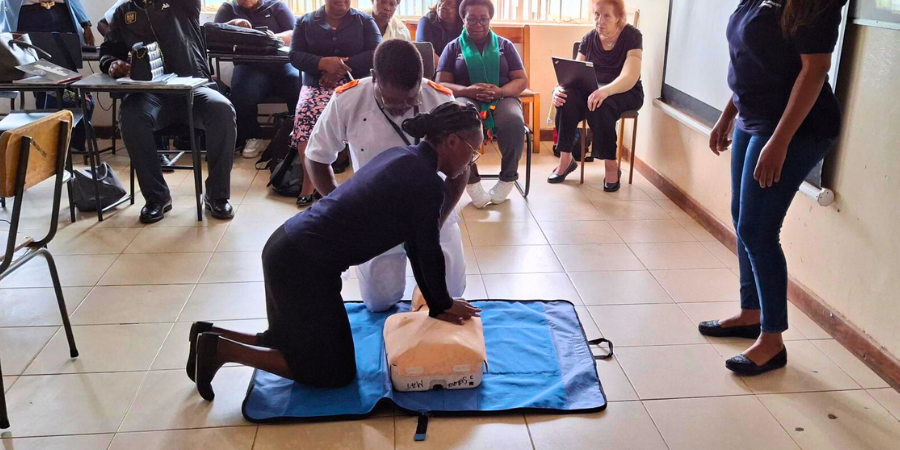Research News Last updated 07 November 2025

Researchers from Birmingham City University (BCU) have been invited to work with the Critical Care Nurses Association of Zambia to help develop a CPR training programme there.
The partnership included the Lusaka College of Nursing and Midwifery in Zambia, a leading education provider of emergency, trauma and critical care nursing for central Africa.
Over 160 students and nurses from across central Africa attended a training and presentation day (23 October) at Lusaka College, during the annual World Restart a Heart campaign.
Research by NICE found that immediate initiation of CPR can double survival rates of a cardiac arrest, but for some healthcare workers in central Africa there is still a lack of confidence in providing lifesaving care.
“Before the training, CPR was seen as a task to be carried out by more senior health care professionals like doctors or anaesthetists,” said Mwaka Chungwe, a lecturer at Lusaka College of Nursing and Midwifery, and a BCU nursing alumnus.
“But we now recognise that CPR is a basic skill that’s necessary for all staff working in a clinical setting.
“We’re now working with BCU to develop a CPR training package that’s open to critical care nursing students across Zambia as well as corporate and community organisations which will help save lives outside of hospital.”
Organised by the Centre for International Health Partnerships at BCU, there were also panel presentations and the launch of a CPR study in collaboration with the Ministry of Health in Zambia and the Critical Care Nurses Association of Zambia.
“This study will create a better understanding of the current state of CPR training and education in Zambia and support the development of further resources and national guidelines,” said Joy Notter, Professor of Community Nursing at BCU.
“Nurses are crucial in these situations as they are often the first responder in a hospital setting to recognise a cardiac arrest and initiate CPR.
“By working with hospitals and healthcare bodies in Zambia to build CPR training programmes we’re sharing good practice as educational institutions but also building future nursing leaders.”
The event in Zambia was held in conjunction with training at BCU and presentations by BCU nursing staff.
“There’s still a strong need for CPR training in the UK too,” said Scott Colton, Senior Lecturer in Adult Nursing at BCU.
“In the UK, fewer than 1 in 10 people survive an out-of-hospital cardiac arrest.
“We all need to be confident in recognising signs of a cardiac arrest, and what to do in the event of one.”
Since 2015, BCU has been actively engaged in Zambia, training 400 nurses and 1,600 healthcare workers throughout the Covid-19 pandemic.
“The day wasn’t just about training people in CPR,” said Associate Professor Chris Carter, a BCU Critical Care lead educator and international expert in critical care in resource limited settings.
“We got to listen to fascinating discussions about CPR in settings across the world, and how it differs to our experiences in the UK.
“At BCU, we’re committed to continue working with stakeholders, organisations and education providers in Zambia to strengthen cardiovascular nursing in central Africa.”